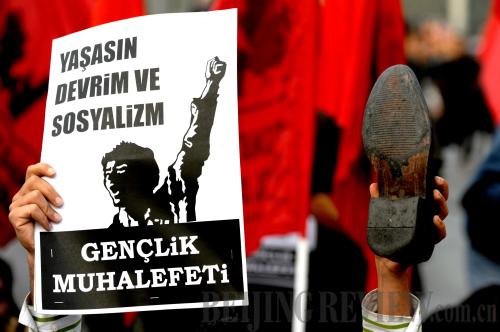|
 |
|
VOX POPULI: A Turkish protestor holds up his shoe and a poster during an anti-International Monetary Fund and World Bank rally in Istanbul on October 1, days before the two institutions' annual meetings in the Turkish capital (XINHUA/AFP) |
In contemplating how to avoid a repeat of the global financial crisis while devising a more sustainable international exchange rate regime, the world community is pinning high hopes on the International Monetary Fund (IMF), which has been expected to stabilize the international financial order.
Indeed, it has become a common belief among analysts that the root cause of the ongoing financial and economic crisis is the oversupply of money worldwide.
This problem arose not only from some governments' deliberate issuance of surplus money, but also from the overuse of financial derivatives in developed countries. In the context of globalization, however, it quickly spread to affect almost every country—giving rise to inflation and the emergence of asset bubbles across the world.
Under the fixed exchange rate regime, the international money supply was under effective control, because countries were obligated to peg their currencies to the dollar.
But as they switched to floating exchange rates, unfortunately, the world community found itself unable to rein in the oversupply of money. In fact, some European countries suggested in 2008 establishing a new Bretton Woods system to curb competitive currency depreciation and excess money supply. This would have been a revisit to the goals first put forward more than six decades ago.
Representatives from 44 countries decided to set up a system of rules and institutions, including the IMF, to regulate the international monetary system in the American town of Bretton Woods at the UN Monetary and Financial Conference in July 1944.
Moreover, they took the decision three years before the signing of the General Agreement on Tariffs and Trade, the predecessor of the World Trade Organization (WTO)—evidence that a stable international monetary system is a precondition to the development of world trade.
In the end, the Bretton Woods system collapsed in the 1970s, when the fixed exchange rate regime gave way to one featuring floating exchange rates. The ensuing chaos once again awakened the international community to the importance of a stable international monetary system.
A crisis of confidence
There is no denying the IMF's position, already weakened over past decades, rendered it all but helpless when the global financial crisis broke out.
Nonetheless, the magnitude of the crisis, coupled with the IMF's inadequate financial resources, is part of the reason. More importantly, however, the fund is suffering from a crisis of confidence—lacking trust from the international community, in particular developing countries.
Although it played a significant role under the Bretton Woods system from the 1940s to the 1970s, the IMF would soon lose its direction. Its formerly clear-cut mission to maintain the stability of the international monetary system became increasingly dubious and was eventually largely abandoned.
Moreover, even as it carried out its remaining functions to help its members solve short-term cash flow problems in international trade, it also drew criticism from developing countries because of the approaches it adopted in formulating policies. Doubts about the fund in particular escalated to new heights after the devastating Southeast Asian financial crisis of 1997.
Consequently, an increasing number of emerging markets and developing countries were reluctant to believe that the IMF can address conflicting interests between developed and developing countries.
Some countries went as far as questioning the IMF's true motives in offering assistance. To a large extent, these growing concerns have resulted from the unsatisfactory results of the IMF's assistance. The stark absence of democracy in its internal governance has also complicated matters.
While decisions of less importance call for a simple majority, major decisions require either a 70-percent or 85-percent majority, according to the IMF's Articles of Agreement. In fact, the IMF gives the same number of votes to all its members as basic votes, in addition to the votes determined according to their contributions, or quotas, to the fund.
Since its establishment, the number of votes at the IMF has posted a 37-fold increase. The proportion of basic votes, therefore, has declined to 2 percent from 11.3 percent overall. As a result, "one vote for one dollar" has replaced "one vote for one country," as the IMF's voting principle.
| 